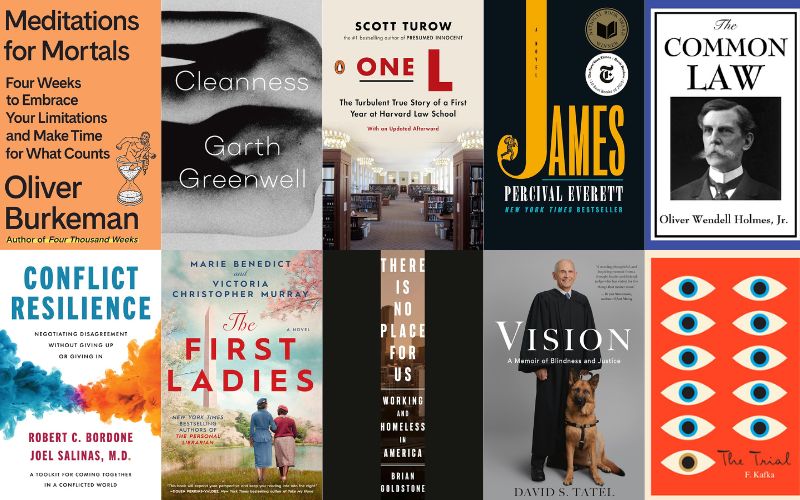Looking for your next summer read? WashU Law faculty have you covered. From gripping legal thrillers and classic literature to thought-provoking nonfiction, their recommendations offer something for every reader.
Judge David Tatel’s Vision: A Memoir of Blindness and Justice
Recommended by Travis Crum, Professor of Law
A memoir by one of America’s most accomplished public servants and legal thinkers who spent years denying and working around his blindness, before finally embracing it as an essential part of his identity.
James by Percival Everett
Recommended by Danielle D’Onfro, Treiman Professor of Law
When Jim overhears that he is about to be sold to a man in New Orleans, separated from his wife and daughter forever, he runs away until he can formulate a plan. Meanwhile, Huck has faked his own death to escape his violent father. As all readers of American literature know, thus begins the dangerous and transcendent journey by raft down the Mississippi River toward the elusive and unreliable promise of the Free States and beyond.
One L by Scott Turow
Recommended by John Drobak, George Alexander Madill Professor of Real Property & Equity Jurisprudence
It was a year of terrors and triumphs, of depressions and elations, of compulsive work, pitiless competition, and, finally, mass hysteria. It was Scott Turow’s first year at the oldest, biggest, most esteemed center of legal education in the United States. Turow’s experiences at Harvard Law School parallel those of first-year law students everywhere. His gripping account of this critical, formative year in the life of a lawyer is as suspenseful, said The New York Times, as “the most absorbing of thrillers.”
Cleanness by Garth Greenwell
Recommended by Brenda Dvoskin, Associate Professor of Law
In this atmosphere of disquiet, an American teacher navigates a life transformed by the discovery and loss of love. As he prepares to leave the place he’s come to call home, he grapples with the intimate encounters that have marked his years abroad, each bearing uncanny reminders of his past. A queer student’s confession recalls his own first love, a stranger’s seduction devolves into paternal sadism, and a romance with a younger man opens, and heals, old wounds.
Meditations for Mortals: Four Weeks to Embrace Your Limitations and Make Time for What Counts
Recommended by John Inazu, Sally D. Danforth Distinguished Professor of Law & Religion
Addressing the fundamental questions about how to live, Meditations for Mortals offers a powerful new way to take action on what counts: a guiding philosophy of life Oliver Burkeman calls “imperfectionism.” It helps us tackle challenges as they crop up in our daily lives: our finite time, the lure of distraction, the impossibility of doing anything perfectly, the feeling that the world is spinning out of control.
The Trial by Franz Kafka
Recommended by Ben Levin, Professor of Law
The story of Josef K., a man arrested and prosecuted by a remote, inaccessible authority, with the nature of his crime revealed neither to him nor to the reader.
There is No Place for Us: Working and Homeless in America by Brian Goldstone
Recommended by Stefanie Lindquist, Nickerson Dean and Professor of Law
In a country where hard work and determination are supposed to lead to success, there is something scandalous about this phrase. But skyrocketing rents, low wages, and a lack of tenant rights have produced a startling phenomenon: People with full-time jobs cannot keep a roof over their head, especially in America’s booming cities, where rapid growth is leading to catastrophic displacement. These families are being forced into homelessness not by a failing economy but a thriving one. In this gripping and deeply reported book, Brian Goldstone plunges readers into the lives of five Atlanta families struggling to remain housed in a gentrifying, increasingly unequal city.
The Common Law by Oliver Wendell Holmes
Recommended by Russell Osgood, Professor of Law
Oliver Wendell Holmes, Jr. (1841–1935) is generally considered one of the two greatest justices of the United States Supreme Court. In The Common Law, derived from a series of lectures delivered at the Lowell Institute in Boston, Holmes systematized his early legal doctrines. The result was an enduring classic of legal philosophy that continues to be read and consulted over a century later.
The First Ladies, Marie Benedict & Victoria Christopher Murray
Recommended by Leila Sadat, James Carr Professor of International Criminal Law
A novel about the extraordinary partnership between First Lady Eleanor Roosevelt and civil rights activist Mary McLeod Bethune—an unlikely friendship that changed the world, from the New York Times bestselling authors of the Good Morning America Book Club pick The Personal Librarian.
Conflict Resilience: Negotiating Disagreement Without Giving Up or Giving In by Robert Bordone and Joel Salinas
Recommended by Karen Tokarz, Charles Nagel Professor of Public Interest Law & Policy
Conflict management expert Robert C. Bordone and leading behavioral neurologist Joel Salinas, M.D., join forces to introduce conflict resilience: the radical science of standing strong in the face of conflict and breaking the bad habits that sabotage our politics, workplaces, and most important relationships.
